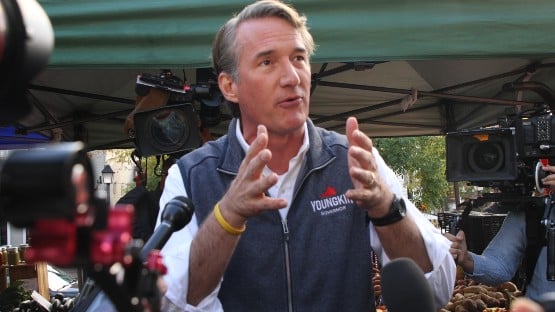
You might remember how Donald Trump needled Glenn Youngkin back in November over how Youngkin’s name supposedly “sounds Chinese.”
Did this have anything to do with the move by Youngkin to get Virginia out of the running for a new Ford battery plant?
The far-right news website Daily Caller reported last month that Youngkin directed the Virginia Economic Development Partnership to remove Virginia from the running for a new multibillion-dollar plant to manufacture lithium iron phosphate batteries for Ford’s electric models
The reason: concerns over possible Chinese Communist Party influence.
Seriously.
Youngkin confirmed as much this week. Speaking with reporters after his State of the Commonwealth address, he said his administration “felt that the right thing to do was to not recruit Ford as a front for China to America.”
This despite the link between the Ford battery plant and the CCP being tenuous at best.
Virginia Mercury reported on Thursday that a Youngkin spokesperson said the governor was referring to the possibility that the battery plant would be operated by Contemporary Amperex Technology Co., a Chinese company.
A Ford spokesperson confirmed to Virginia Mercury that the auto company has an agreement in place with CATL to explore possible cooperation for supplying batteries for Ford vehicles in markets across North America, Europe and China, but has nothing concrete in place beyond that exploration.
Bloomberg reported last month that Ford and CATL have been weighing an ownership structure under which Ford would own 100 percent of a future U.S.-based battery plant, including the building and the infrastructure, while CATL would operate the factory and own the technology to build the cells.
The idea behind this kind of arrangement would be to allow the facility to qualify for production tax credits under the Inflation Reduction Act while requiring no direct financial investment from CATL.
The pushback from Youngkin matches that from the Chinese side: Bloomberg reported that the Chinese government is discouraging investments in the U.S. by CATL, which paused plans this summer to establish a new facility in North America after House Speaker Nancy Pelosi’s trip to Taiwan.
A CATL spokesperson told Bloomberg that it is not true that the Chinese government is discouraging it to invest in the U.S., and that the company “is still deliberating on investing in the US, and we have not made the decision yet. There are multiple models being discussed regarding our investment in the US, and all of those choices are purely based on and only based on business concerns.”
This level of public back-and-forth about an economic development project that seems far from becoming any kind of reality is unusual, to say the least, given the tight-lipped secrecy typically afforded to such ventures.
That’s no doubt because of the politics involved, including, for Youngkin, his cockamamie idea that he might somehow be a legitimate contender for the 2024 Republican presidential nomination.
In the effort to buttress his foreign policy bona fides, Youngkin, in his State of the Commonwealth address, made sure to come across as borderline obsessed about China, issuing a dire warning on “the ever-growing threat that the Chinese Communist Party poses to our national security, our privacy and our way of life in Virginia,” and advising that “Virginians should also be wary of Chinese Communist intrusion into Virginia’s economy.”
This from a guy who, as the Virginia Mercury story noted, was up front after his speech to lawmakers that he is “uniquely positioned to understand how the Chinese Communist Party works” because of the job that he had before he ran for governor, as co-CEO of the Carlyle Group, a private equity firm that has invested heavily in China.
One question for Youngkin, whose net worth is reportedly in the range of $470 million, according to Forbes: how much of your personal fortune comes from those investments in China?
Maybe that’s why Trump’s needles struck a nerve back in November.










